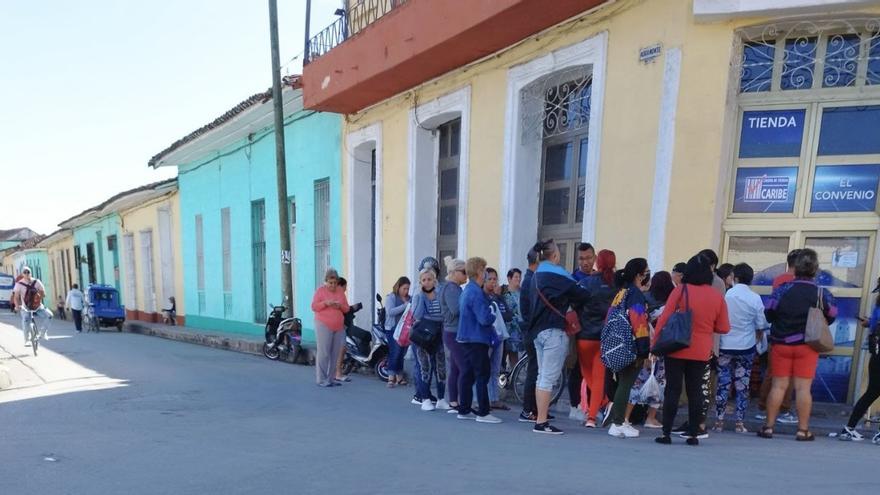
![]() 14ymedio, Mercedes García, Sancti Spíritus, 15 April 2023 — “Between 11 in the morning and one in the afternoon you have to disconnect the central electricity and have zero consumption.” This is the information that state companies in the province of Sancti Spíritus are receiving. The measure, implemented a few days ago, aims to drastically reduce energy expenditure in search of a desperate palliative to the fuel deficit that Cuba is experiencing.
14ymedio, Mercedes García, Sancti Spíritus, 15 April 2023 — “Between 11 in the morning and one in the afternoon you have to disconnect the central electricity and have zero consumption.” This is the information that state companies in the province of Sancti Spíritus are receiving. The measure, implemented a few days ago, aims to drastically reduce energy expenditure in search of a desperate palliative to the fuel deficit that Cuba is experiencing.
“Now the guidance, unlike other times when we were asked to turn off some lights and air conditioners, is that we must shut down the central power to avoid consumption between those hours,” explains an employee of a branch of the Cimex Corporation, managed by the Cuban military, which deals with part of the retail trade in the province.
“In our office, from 11 in the morning until one in the afternoon, the central electricity must be cut off, which complicates all our work that involves computers, printing invoices and other tasks that need electrical equipment,” laments the worker.
In a nearby office of the state telecommunications monopoly, Etecsa, the panorama is repeated. “When last year we were told that we had to turn off the lights and air conditioners, people looked for solutions,” says a young employee who prefers anonymity. “In order not to have to suffer from the heat, the workers brought their own fans.”
Instead of saving electricity in the two regulatory hours of blackout, in many of these premises consumption remained unchanged. “We went from using two air conditioners to having eight or nine fans connected. What was saved on the one hand was spent on the other,” acknowledges the man, who works in the area of attention to the population.
“We closed and did not accept more customers at that time, but we had to stay inside the office, which was hellish because of the heat, especially in the summer,” he says. “Apparently they realized that a lot of electricity was not being saved, and now the administrator will be in charge of turning off the central power. No one will be able to connect their fan or charge their cell phone.”
The measure joins others that have been taken in the province and throughout Cuba due to the fuel crisis that the Island is going through. “We have a very diminished fleet of merchandise delivery trucks; we have had to change the hours of supplying the stores, and now there are two hours a day when we will not be able to do anything,” says the employee, summarizing the situation in the provincial subsidiary of Cimex.
Sancti Spíritus, a territory that connects the flow of vehicles arriving from the west to the east of the Island and vice versa, has experienced a notable decrease in traffic. “Now you spend hours to get from the city of Sancti Spíritus to Trinidad because the drivers don’t have fuel,” says Mirna, age 59, whose family is divided between the provincial capital and the beautiful Valle de los Ingenios.
“Sometimes I go for days without seeing my daughter, as if we lived in different provinces. If you look at a map, her house is right there. With no cars or trucks, we are incommunicado within the province itself,” she adds.
Mirna does not seem very worried about the repercussions that the new energy-saving measure will have on the lives of workers in the state sector. “They don’t do much anyway,” she concludes. “Here it’s been a long time since you could do paperwork or budgets during those hours, so it’s more of the same.”
Next Monday, Mirna’s husband, who has an administrative position in a municipal office, will have to “turn off the electricity” at work. “He can’t do anything else. It’s what they’ve told him and what he has to do, but he already told me that during that time he’s not going to stay inside the premises, which is an oven. He says he’s going to sit in the park.”
Translated by Regina Anavy
____________
COLLABORATE WITH OUR WORK: The 14ymedio team is committed to practicing serious journalism that reflects Cuba’s reality in all its depth. Thank you for joining us on this long journey. We invite you to continue supporting us by becoming a member of 14ymedio now. Together we can continue transforming journalism in Cuba.
